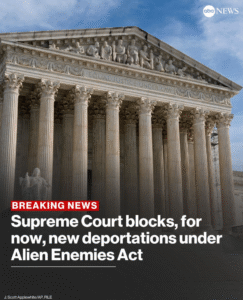On April 19, 2025, the U.S. Supreme Court issued an emergency order temporarily halting the Trump administration’s deportation of Venezuelan detainees under the Alien Enemies Act (AEA), a rarely used 1798 wartime statute. This decision came in response to an urgent appeal from the American Civil Liberties Union (ACLU), which argued that the detainees were being removed without adequate notice or an opportunity to challenge their classification as “alien enemies” .The Guardian+3Vanity Fair+3AP News+3
The administration had invoked the AEA to deport Venezuelan men alleged to be members of Tren de Aragua, a Venezuelan gang designated as a terrorist organization. Critics, however, contended that the evidence for such affiliations was often tenuous, sometimes based solely on tattoos, and that detainees were not given proper legal avenues to contest their removal .Deseret News+5Vanity Fair+5FactCheck.org+5
The Supreme Court’s unsigned order, issued just after midnight, directed the government not to deport any detainees from the Bluebonnet Detention Center in Texas until further notice. Justices Samuel Alito and Clarence Thomas dissented, with Alito later criticizing the majority for acting hastily without full briefing or input from the administration .AP News+1Wikipedia+1
This ruling follows a series of legal challenges against the administration’s use of the AEA. Previously, the Supreme Court had allowed deportations to resume but emphasized that individuals must be given reasonable time to challenge their removal in court . Despite this, reports emerged of deportations proceeding without such opportunities, leading to accusations of the administration flouting court orders .Wikipedia+1Politico+1UPI+1Wikipedia+1
One notable case involved Kilmar Abrego Garcia, a Salvadoran man deported despite a court order blocking his removal. The administration’s failure to comply with the order led to discussions of potential contempt proceedings .Politico+2Latest news & breaking headlines+2Vanity Fair+2Vanity Fair+2Wikipedia+2Latest news & breaking headlines+2
The administration defended its actions, labeling the legal challenges as “meritless” and asserting that the deportations were necessary for national security. However, legal experts and civil rights advocates argue that the use of the AEA in this context raises serious due process concerns and sets a troubling precedent for executive overreach .Politico
The Supreme Court’s intervention underscores the ongoing tension between the judiciary and the executive branch over immigration enforcement and the rights of non-citizens. As legal battles continue, the fate of many detainees remains uncertain, highlighting the complexities and controversies surrounding the application of centuries-old laws in modern contexts.
